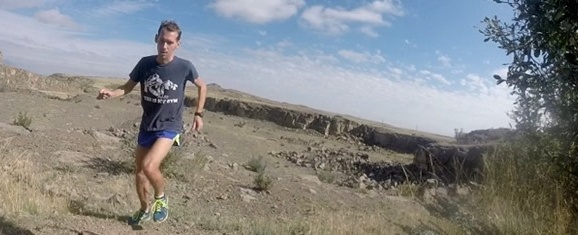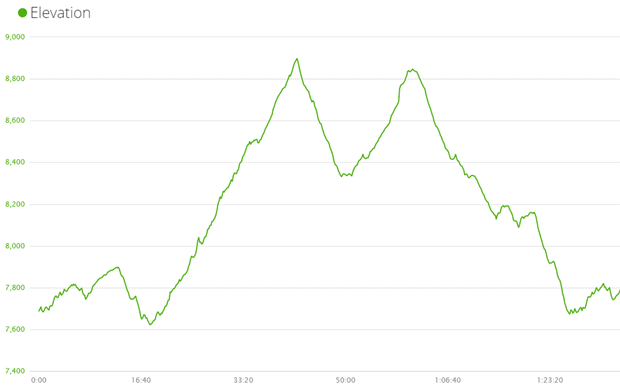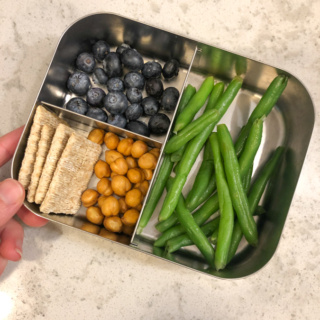I’m on vacation this week and have asked my Nutrition for Runners co-author, running coach Jason Fitzgerald of Strength Running, to share a guest post on how his diet has changed (and consequently, his running) since meeting me and writing our nutrition program together. Read on to see how he went from cookie monster… to altitude master. 🙂
Cookie Monster to Altitude Master:
How I Upgraded my Diet & Never Felt Better
by: Jason Fitzgerald
Everything changed when I met Anne. I stalked her on Twitter for a few weeks (c’mon, everyone does it!), reading her thoughts on nutrition and staring dreamily at her fan(ne)tastic food porn. I knew at the time that I needed to work with a Registered Dietitian – but not just any dietitian. I needed an RD who understood runners (because she was one herself!) and how to eat for maximum recovery, fueling, and energy. So after a few emails back and forth, we met in downtown DC for a coffee. And everything changed. She agreed to work with me on an extensive nutrition program designed specifically for runners. Our goals were simple:
- Lay out the ideal diet for runners training for any race from 5k to marathon.
- Make it simple! No calorie counting, “scoring” foods, or calculations. No stress! And it must include only food that’s widely available.
- Give runners access to everything they need to succeed: meal timing schedules, dietitian-approved recipes, and training plans
I knew that if a USA Track & Field-certified coach (that’s me!) and a Registered Dietitian could work together, we could help more runners dial in their nutrition to feel more energized than ever. Over the next eight months, we spent countless days researching, writing, interviewing world-class experts, and building what would become Nutrition for Runners – the most comprehensive nutrition and fueling program for runners on the market.
We’re thrilled with the product – and more importantly, with the success of runners like Elisa and Carol:
“I just wanted to say that I am really pleased with my Full Package purchase of Nutrition for Runners. I’m already implementing changes to my diet and I’m very excited about the specific race recommendations. I’m a few minutes away from hitting a 90 minute half marathon goal and I truly believe honing down on nutrition will make all the difference.” – Elisa
“With the Nutrition for Runners program my eating habits have improved SO much. The choices I’m making are totally different from what they used to be – I don’t crash in the afternoons and evenings and don’t find myself eating junk food. I’ve lost weight in the process too, which I’m still incredulous about – doesn’t weight loss mean feeling cranky and starving and deprived? Apparently not 🙂” – Carol
And today, I want to give you a glimpse of the incredible progress that I’ve personally experienced with my running from improving my diet. None of it would have been possible without Anne and her guidance.
Flashback: Why is altitude so easy?!
I now live in Denver, Colorado, which gives me access to some of the best trail running in the country. The only drawback is that you’re in the mountains! Altitudes of 7,000 – 10,000 are common if you move beyond the Front Range. And the amount of oxygen in the air is far lower, making running incredibly difficult. But as a new resident of Colorado last summer, I had to explore!
So every weekend, I set out for my long run in the Rocky Mountains. At the same time, I increased my mileage by 40% (not recommended…). After two weeks, I was covering nearly double the mileage that I had for the last three months.
Amidst the dramatically higher mileage and frequent long runs at altitude, I felt incredible! My energy was higher than it had ever been before and I recovered from grueling workouts faster than ever. My legs felt great – even after pounding thousands of elevation gain and loss in the mountains. I felt like I was 17 again galloping up and down mountains like this:
These trails aren’t only at high altitudes, they’re also on very technical terrain with switchbacks, rocks, roots, and stream crossings. But my pace was surprisingly fast. And the funny thing is that I wasn’t even training for a race!
I credit Anne for how I felt. The Running Nutrition Q&A audio seminars we recorded were particularly helpful (hearing questions from other runners and Anne’s answers made me think of questions I didn’t even know I had!). Just imagine how you’d feel running 15-19 miles on technical, mountainous terrain at altitude. And then recover faster than if you did a flat run at sea level! I know that I felt better than ever. And my results are undeniable:
- I tied my weekly mileage record (91) but without feeling overly tired
- My energy was higher than ever, letting me play with my daughter, be productive at work, and still have fun
- Complete my longest run ever: more than 2:42 minutes at an average altitude of 8,500 feet
Plus, I was getting up early to do these crazy long runs (I’m not a morning person) and that made me feel accomplished all day long.
The “Frontloading” Approach
One of the most valuable lessons I learned working with Anne is that there isn’t one magic diet. You can be healthy on a Paleo or Vegan diet.
Even though we both believe in a whole food-based diet that includes meat, the more important strategies are about how you eat. And when we interviewed Nancy Clark (a best-selling author and one of the world’s most famous sports dietitians – she’s been on the back of a Wheatie’s box!), she reaffirmed Anne’s approach.
One aspect of this philosophy is to frontload your diet. Or in other words, to eat more of your food during the first half of the day than the last. This approach has several benefits:
- It helps you feel more satisfied and eliminates “Cookie Monster” sugar cravings later in the day
- You’ll have more energy throughout the day with fewer dips in productivity
- You’ll sleep better (since you aren’t trying to go to bed completely stuffed)
I’m typically someone who doesn’t eat much breakfast. I used to do the opposite and backload my calories with a huge dinner and evening snacking. But I made the switch – and how I felt during the day (and just as importantly, how I ran and recovered) was improved by leaps and bounds.
There were other strategies that I used as well – like eating mostly “real” food, training correctly, and changing how I structured my meals. When I used all of them, I never felt better. Of course, I’m just one person. But you can see similar results with runners like Aaron, Mike, and Nick. And we think that you’ll improve your running, energy levels, and recovery as well. Just imagine if you were at your appropriate goal weight while being properly fueled for all of your runs so you feel great and perform at your best. If you’d like to learn more about this approach, Anne and I have put together a free email course on nutrition that includes:
- Two free audio downloads of Anne and I taking questions from runners like you on fueling, maintaining goal weight, and more
- Inspiring case studies to show how other runners lost weight and fueled smart
- What not to do – so you can focus on what works
Happy running!









